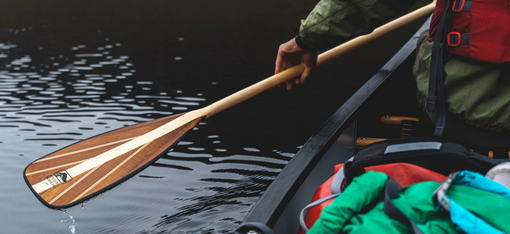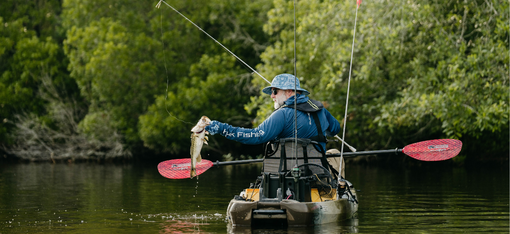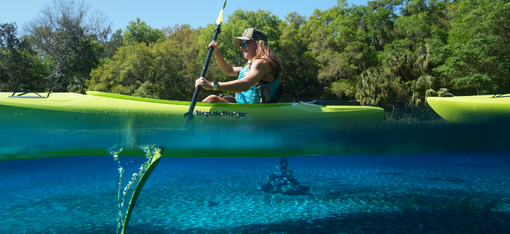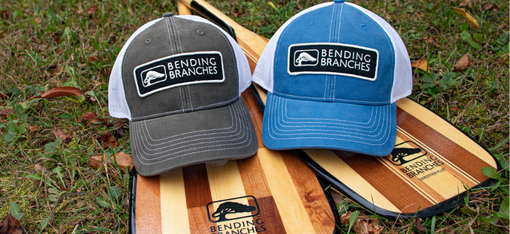This Generational Family Business Teaches Boys Canoe & Life Skills
10-minute read
Ashley Bredemus and her husband Victor Pilon own and direct Birchwood Wilderness Camp in northern Minnesota. Canoeing and canoe trips are core to the programming of this small boys’ camp.
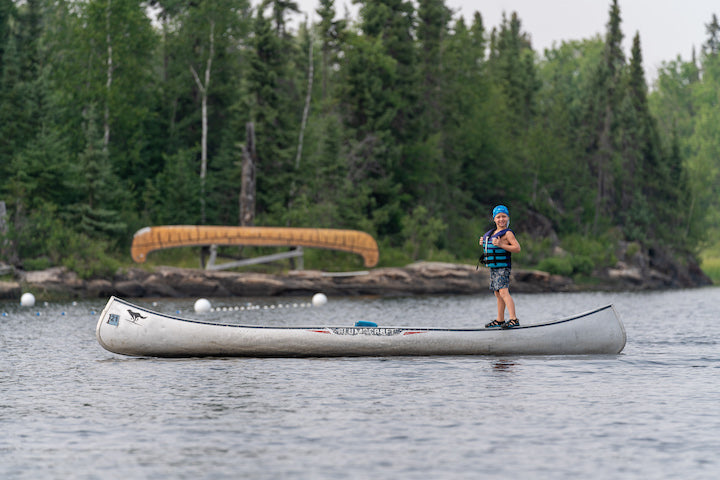
Young camper feeling confident on his canoe at Birchwood Wilderness Camp
Birchwood has been in Ashley’s family since 1968 when her grandparents bought the property, just four miles from the Canadian border. In 1978 the area just north of their property line became part of the Boundary Waters Canoe Area Wilderness (BWCAW) with its million acres of forest, lakes and rivers.
After a few years out-of-state pursuing an engineering career, Ashley moved to Birchwood full-time in 2018 to co-run it with her dad, Dan Bredemus. She and Victor became the camp’s official owners in 2020 (what a year to buy a summer camp!).
The family has intentionally kept Birchwood Wilderness Camp small. Boys from ages 7 to 17 come to camp with a counselor-to-camper ratio of just 1-3. Camp life is designed with four main goals in mind:
- Provide positive role models—For their summer staff, they recruit college students and young teachers who have a passion for kids.
- Teach life skills—The activities offered through Birchwood are ones campers can keep doing their whole lives.
- Develop a “Web of Friendship”—Campers build friendships that are lifelong.
- Give awareness of the outdoors—The boys are encouraged to develop an appreciation for the wilderness that will follow them into their future.
Many of their campers come from the Twin Cities and Chicago. But they get campers from as far away as Texas, California, Montana and Pennsylvania. They also usually get a boy or two from overseas who has some kind of family connection to Minnesota.
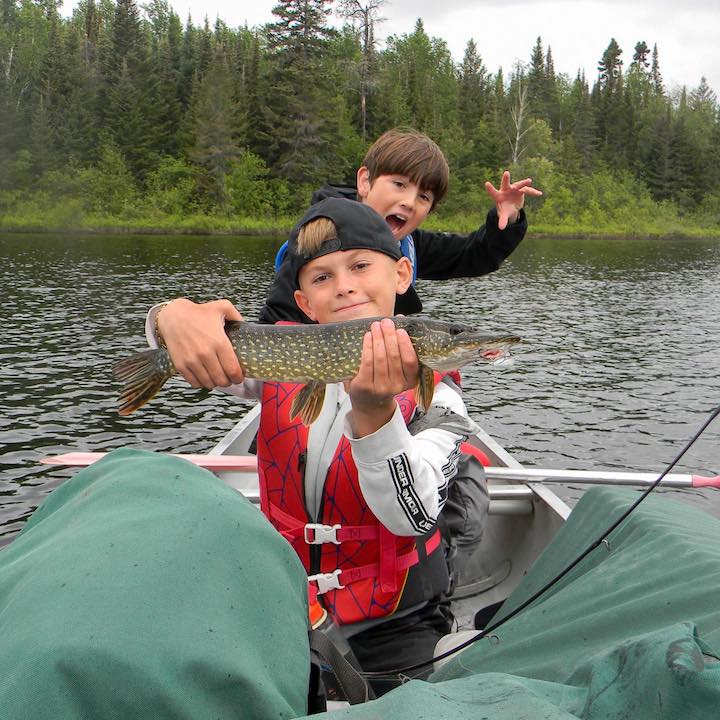
A little fishing from the canoe
We were able to get Ashley on a call recently to learn more about Birchwood and her life there.
Here’s our interview with Ashley Bredemus:
BENDING BRANCHES: What was it like growing up in this family business and how has it shaped you personally?
ASHLEY: We live at camp year-round here and I'm sitting in what we call the Big House. It's the big log cabin on the property that my mom and my dad built in the 80s. It's become our home—that’s where my husband and I live. We've got this canoe up in the rafters that’s the one I learned to canoe in. It’s one of the two original canoes my grandfather bought when he started the girls’ camp in ’58. And it's got Bending Branches paddles sitting inside the canoe.
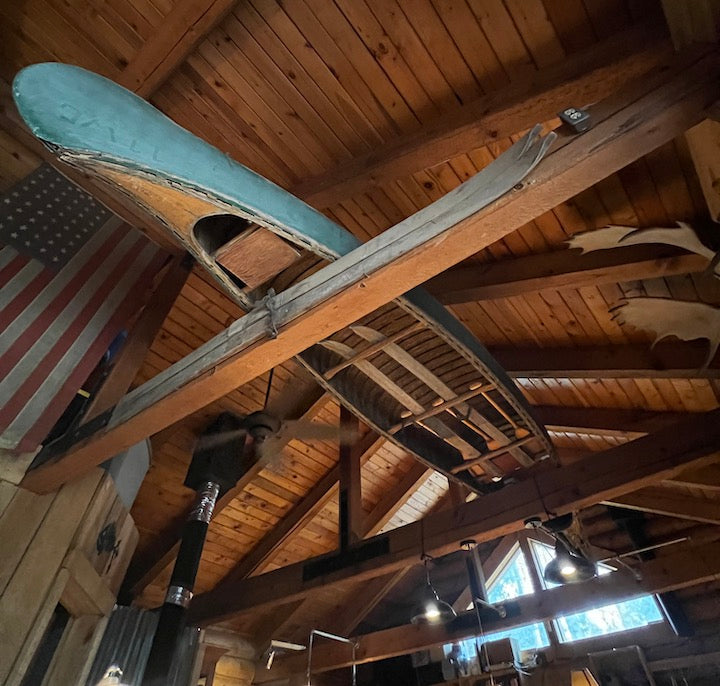
Veteran canoe and vintage Branches paddles now decorate the camp’s Big House
Down at the Pepper Shack where we sleep—a much smaller cabin that my parents and my grandmother built in the 80s as well—up in the rafters is a tiny baby paddle from Bending Branches. That was my first paddle.
I grew up going to the girls’ camp as a camper [Camp Birchwood, also in Minnesota and now sold outside Ashley’s family] so I didn’t spend a lot of time at the boys’ camp when I was a kid. I didn’t have much of a connection to it other than knowing it was an important place to my parents.
Then my dad took me on my first Boundary Waters trip when I was a young teenager, and we ended the trip coming through here. That was my first impression of the place.
A few years later when I had just graduated from high school, my dad and I came here for a month. My cousins were running the camp at the time. We rebuilt the water slide, a big land swing, a zip line and a cabin.
At the girls’ camp, I was more focused on sailing. But I think it teaches a lot of similar skills that canoeing teaches. There are a lot of hard skills to learn, but these hard skills all teach soft skills like how to communicate with the people on your boat, how to make decisions. It prepared me really well in a lot of ways for what I do now.
BRANCHES: In what ways do camp in general and canoeing specifically offer such wonderful opportunities to build life skills and character?
ASHLEY: One thing my grandfather Jim was always adamant about with the camps was teaching life skills. Things you can do well into adulthood. Canoeing, that’s a life skill you can do forever. Skiing, sailing, things like that were really important to my grandparents. So I grew up around that. It was really instilled in me at a young age.
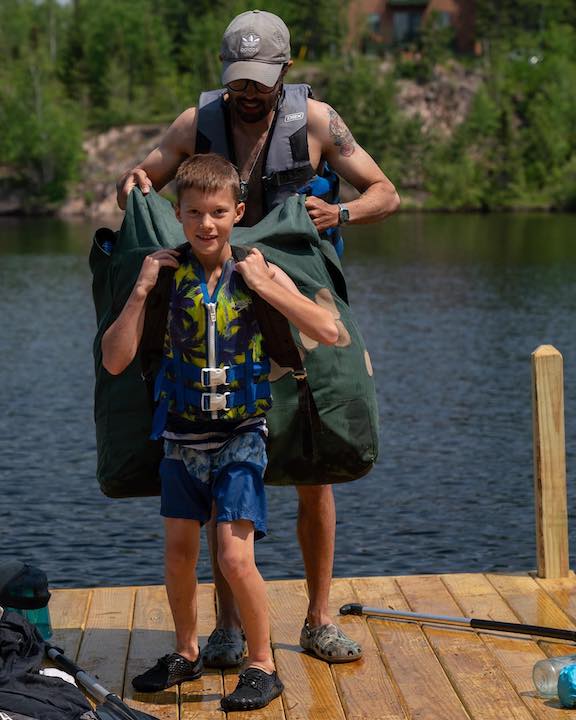
A young camper ready to portage
And there’s this really special thing that happens at summer camps. You create this small intentional community that has a shared sense of purpose. And that's a really beautiful thing to be a part of as a camper, a counselor, and now as an owner. It’s wonderful to be a part of that. Paddling, sailing, whatever it is with a group of girls or boys, feeling like you have a common goal.
That’s what we do every summer. One of the things I love the most is we've got 20 staff and 46 campers, and it feels like we're all in this together working towards some common goal. You miss out on that today a little bit. You live in your apartment and you've got your Netflix. It’s so easy to become isolated and not feel like you have a shared sense of purpose.
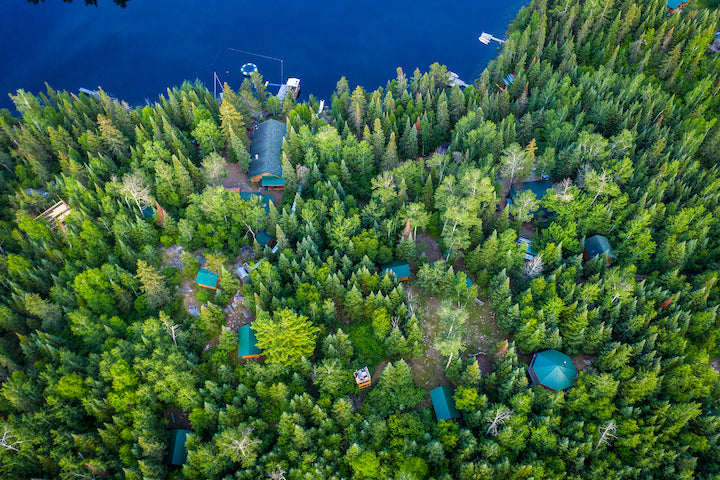
Aerial view of Birchwood Wilderness Camp
BRANCHES: What’s the advantage of a boys-only camp?
ASHLEY: For a number of years we would have a group of girls come through from the girls’ camp and stay a night at the boys’ camp and then go out on a canoe trip. That was very interesting to see the difference that happens. These boys—who we usually have to encourage to shower—when they hear the girls are coming, there’s a line at the shower house! They're ready to put on a show.
And so that switch in dynamic is so interesting to see. I felt the same at the girls’ camp. There was a small maintenance staff there, and one of the guys on the maintenance staff was a teenage boy. Girls were breaking things in their cabin so he would come and fix the things they broke!
So when that variable is introduced, you really see the difference. When it's just the girls nobody's wearing makeup. Nobody’s putting on a show. You just feel like you can be yourself. It changes the focus and places the value on something different for a time.

Campers and counselors at Birchwood Wilderness Camp
And the same thing happens with the boys. They're not worried about looking stupid because a girl is watching or trying to impress anybody. It lets them fully be themselves and learn about what it is to be a boy without that other variable. And I think that's a really beautiful thing.
BRANCHES: What kinds of wilderness canoe and camp skills do the boys learn at Birchwood?
ASHLEY: If we have a 7-year-old on a trip—which is the youngest we accept—who's never been paddling before, we just want this to be a positive experience. So he's not expected to navigate or cook. Our counselors are just going to try to get him involved in a way that feels positive and comfortable for him.
Then next year maybe these young ones will show some interest in our Wilderness Achievement Program. That's where there are different levels and they can earn an achievement pin to put on their French voyager hat.
We have that program for wilderness as well as archery, riflery, fishing and the rest. The boys start out easy with maybe the sense of a map—how do you tell where north is? Learn how to tie a bowline. Just really simple things.
A lot of those skills they have to demonstrate out on-trail when they're on a trip and their counselor checks them off on it. That goes all the way up to planning a full trip and leading it. You’re navigating, you’re directing.

The boys have an opportunity to learn a wide variety of wilderness skills at camp
So every end of the spectrum is encouraged if somebody wants to do something. But we consider ourselves a beginner wilderness camp. It's never expected, only encouraged. We want these kids to have a positive experience.
BRANCHES: Why is canoeing special for a wilderness camp like yours?
ASHLEY: In a nutshell, it's one of those hard skills that teaches the soft skills. I think it was maybe my second Boundary Waters trip with my dad when we were paddling up Gunflint Lake in a headwind. I was in the front of the canoe. I was just so frustrated with this wind and was somewhat throwing a temper tantrum. I wanted to quit. I said, “Dad, I'm done. We need to pull over here at Gunflint Lodge and hitchhike to the car!”
And I think he had a good parenting move by allowing me to do it. He said, “Okay, that's fine.” So we hitchhiked to our car, got in and drove halfway down the Gunflint Trail. The whole time I was thinking, “Oh, I can't quit. I can't let that wind win. That's ridiculous!”
And I gritted my teeth and said, “Dad, you have to turn the car around. We have to finish the trip!” And so we did. We got back in the canoe and finished the trip. And I was so proud of myself for overcoming this whole tantrum I had.
I think that's a good example of how sometimes you'll get the calm waters, but you’re always going to be presented at some time in your trip with a headwind or a storm or bugs that just won't leave you alone. Or you’re new to paddling and you don't know how to do a stroke. Or the portaging is really challenging.
I've learned throughout the years that those little micro adversities are opportunities for growth. And they just stack up through a trip to this whole transformation that happens. And I think that's wonderful. That's what our campers experience on every trip they go on. A variety of transformations. I think paddling is unique in that way and I love that.

Ashley with their dog Arlo, off-season
And then there's the balance of when you get a calm day with a beautiful sunset and it's the most magical thing ever. It's just this perfect experience in my mind.
BRANCHES: How special is this generational passing down of camp and canoeing?
ASHLEY: This camp, this business is so special to me because it was passed down through the generations. And paddling is at the center of that. There's something really special and important about passing that down and giving that to all of our campers.
If somebody reading this has never been paddling before or maybe is new to paddling, the ripple effect that can have throughout the years is wonderful. Passing it down to kids, or nieces and nephews.
Or even passing it up! Some of our campers go home and they feel so accomplished. They say, “Hey, Mom, Dad, Grandma, Grandpa—whoever it is—let me take you on a canoe trip!” And they have the skills to do that.
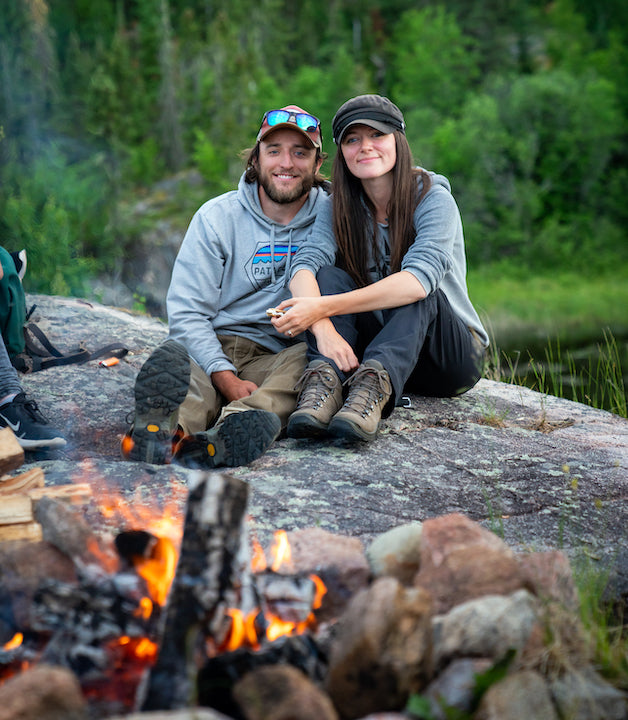
Victor and Ashley, owners and directors of Birchwood Wilderness Camp
A big thanks to Ashley for her time!
All photos courtesy of Ashley Bredumus and Birchwood Wilderness Camp.
Learn more about Birchwood Wilderness Camp on their website. You can follow Ashley and her wilderness life on Instagram.
Do you have paddle questions our friendly Customer Service Team can help you with today? Contact them: 715-755-3405 • [email protected]
More for you...




